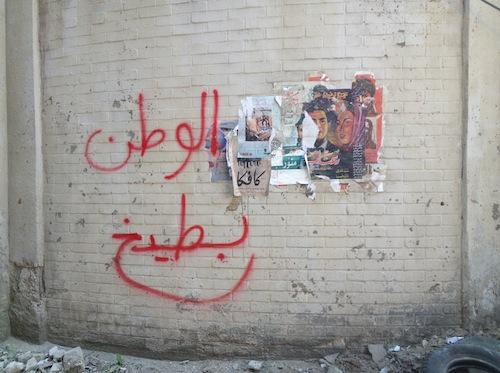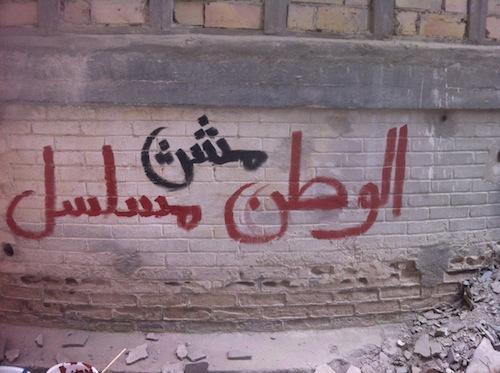Graffiti in Arabic from the set of "Homeland." It reads: Homeland is not a series.
Artists Heba Amin, Caram Kapp and Stone have always had misgivings about how the TV series "Homeland" portrays the Middle East and Middle Easterners.
“'Homeland' is a very well-produced and executed show but it’s also one of the shows that does a great part of the world a huge disservice by misrepresenting it,” says Caram Kapp.

He adds that the series represents Middle Easterners as "either terrorists or refugees."
So when they were asked to create artwork for the set of one of its episodes, they knew exactly what to do.
An episode, which aired last Sunday, takes place inside a refugee camp in Lebanon. To make it look authentic, the producers of "Homeland" hired the artists to spray Arabic graffiti on the walls.
Kapp and the team asked their friends and family for advice.
“[They] sent us a lot of proverbs and Arabic sayings,” he says.
But after he considered all the suggestions, the team came up with an idea: they’d add those proverbs but they’d also add their own commentary.
“Homeland is racist” was one message. Another was “Homeland is a joke, and it didn’t make us laugh.” There was also “#blacklivesmatter.”
There was also this: “Homeland is watermelon.”
"Heba and I both come from Egypt and in Egypt when we say something is 'batikh,' which is Arabic for watermelon, we mean that something is nonsense, that it's fake," explains Kapp.
Over the two days that they spent on the set, the artists were asked twice about what they were writing. At the time, Kapp says they were spraying the Arabic proverbs and so that's what they said the were doing.
A photo posted by showtime (@showtime) on
But overall, he adds, the producers were so busy with the production that no one checked the meaning of the words on the walls.
And to the artists disbelief, the graffiti ended up on the episode that aired last Sunday.
"I was very surprised that the messages were in the show … we were operating on the assumption that they had actually either painted it over on the set or CGI'd it out," Kapp says referring to the computer-generated imagery effect used in films and TV programs.
Kapp adds that he doesn't plan on doing any more graffiti for Hollywood.
But he's glad that they managed to get their message out.
"We did know that it's once in a lifetime opportunity in more than one way. If we hadn't done what we did, we would regret it on a moral basis," he says.
Read Heba Amin's statement about the project here.
Our coverage reaches millions each week, but only a small fraction of listeners contribute to sustain our program. We still need 224 more people to donate $100 or $10/monthly to unlock our $67,000 match. Will you help us get there today?
